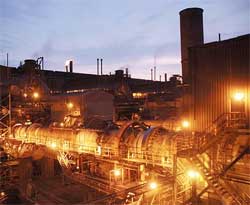Evraz Highveld Steel & Vanadium's share price has gone from nearly R190 in 2008 to about R6 now and one of the most affected shareholders is Rand Merchant Bank, which has a 7.4% stake, in the company according to ShareData Online.

RMB Corvest's Stephen Brown said the offer to RMB at R93 was "too light". Evraz Highveld's share price is now about R6. Image: RMBCorvest
Russian-owned Evraz mining and steel group owns 85% of Evraz Highveld, but it is unclear who owns the rest. Chelsea football club owner Roman Abramovich is the majority stakeholder in the parent company, with about a 31% stake.
In mid-2007 Rand Merchant Bank (RMB) decided to keep its stake in Evraz Highveld - then known as Highveld Steel & Vanadium - when the Russian company offered R93 a share in a bid to get rid of minorities. It eventually took about 85% of the Limpopo-based iron ore, steel and vanadium slag producer.
RMB Asset Manager Portfolio Manager Stephen Brown said of the R93 offer that it was "probably just a little bit too light" and Evraz was attributing a value of about R8.5bn to Highveld's steel and the vanadium assets. But at the time, Standard Bank said R93 a share was at the upper end of its price level, and Anglo American accepted R60 a share for its holding only a few months earlier.
Brown said Highveld's earnings per share would be similar to Mittal's, whose share price at the time was R125.
In its most recent quarter, ended March, Evraz Highveld posted a loss of R105m, sliding from a net profit of R30m in the period last year. It believes the group remains a going concern, despite using credit lines that are committed only to the end of December and which are already fully drawn.
Share price falling as losses mount
In March, the stock plummeted more than 33% on the JSE after reporting an operating loss of R293m in the year to December against a loss of R854m in financial 2012. At the time, the stock was worth only about 9% of its value in early March 2011.

RMB's Pierre Joubert admits that some shares are "not easy to sell". Image: RMB
The company blames its woes on the "slow pace" of large infrastructure projects in SA, a volatile labour force, and "notable" energy tariff increases and supply concerns. Falling production and slowing levels of investment in the mining sector add to this.
Where Evraz Highveld differs from ArcelorMittal SA is that nearly twice as much equity is held by the international parent, making the share highly illiquid. But the topography of the declining share price of SA's second-largest steel producer over the past 10 years is almost an exact copy of ArcelorMittal SA's fortunes.
This speaks volumes for SA's stagnant steel consumption - an average of more than 60% of steel produced is used in construction projects - and shows the desperate kick needed from SA's proposed R4trn infrastructure programme over the next 15 years.
But much of what has been spent on major South African infrastructure so far has gone on trying to alleviate the chronic shortage of electricity that bedevils SA. To this end Evraz Highveld is - like the rest of the nation's industry - held hostage to the country's infrastructure deficits, including those for energy and rail transport.
RMB cannot estimate what its lost
While RMB is unable to say at what price it first bought into Evraz Highveld, or what the average level of shareholding has been maintained, it is apparent that the stake has cost the financial services group dearly over the years. It first bought the share as part of the proprietary trading activities of the bank.
But the Co-Head of Gobal Markets at RMB, Pierre Joubert, says that since Basel 3 came into being the stock has been "earmarked for disposal" as part of the new global banking rules that followed the world financial market crash in October 2008. These new rules in effect banned proprietary trading.
"Some assets are not easy to dispose of," Joubert says. "It applies to this share and we've held it for eight years plus," he said.
But with the Evraz Highveld market capitalisation languishing at about R600m now, that 7.4% shareholding is significantly down on what it was worth at R93 per share.
Joubert says the Evraz Highveld shareholding is sitting on the balance sheet of RMB. But he has no idea what the price was when the bank first bought it, or of its value now. He says the size of the holding might have changed over the years, and now it is part of a portfolio, or a number of portfolios, that are marked to market daily.

Evraz Highveld Steel's plant in Mpumalanga. Image: Evraz Highvel Steel
"But it's not material one way or the other, and there's no liquidity in the share. It won't come up on the regulator's screen - this is not a regulatory problem," he says. "We just need to dispose of it in some way. It might be to someone interested in taking over the company, or a possible de-listing
"As a shareholder we wouldn't provide that level of detail (in disclosure) - it's too small and you won't pick it up in the financials. (But) we will try to maximise the share if and when we dispose of it," he said.
Black empowerment deals
In February 2012, Evraz Highveld finalised a 26% black economic empowerment deal for its Mapochs magnetite iron ore mine in Limpopo worth $59.8m.
That is close to the present market capitalisation of the entire JSE-listed operation, leaving significant questions of value hanging over any sale. A year later the global group announced the signing of a non-binding term sheet for the proposed sale of its 85% stake in Evraz Highveld to an empowerment consortium represented by an entity called Nemascore, for an "indicative" cash price of about $320m.
Nemascore's directors included Linda Makhathini, a legal adviser to President Jacob Zuma during the Schabir Shaik trial. Its registered address in Sandton is also linked to another long-standing presidential legal adviser, Michael Hulley. But nothing has come of this and Evraz Highveld has since said it is negotiating with "other" undisclosed potential buyers.
In April, the group appointed Jan Valenta to succeed Michael Garcia as its Chief Executive. Valenta was Financial Director before his appointment. He says the sale of the company is "progressing very well". But he cannot say who the potential buyers might be, or whether Nemascore is still a part of the bidding process.
"I can't comment (on) whether government or its agencies are involved, or whether it is an empowerment transaction," he says. But he says that not long ago, SA had cheap labour, electricity and iron ore.
"As of now we are pretty much losing some of those advantages. Annual electricity increases are extraordinary, and SA is not competitive enough. We need to push for higher productivity to be competitive."
Valenta says the steel business is a volume business, and the company is not exporting any new product at present. "We have not met production targets. The local market is weak and will remain so until government infrastructure projects pick up."
"However, SA's poor exchange rate has reduced steel imports and Evraz Highveld has seen good margins of late on the domestic market, along with substantial productivity gains," Valenta says.
Source: Business Day via I-Net Bridge








































